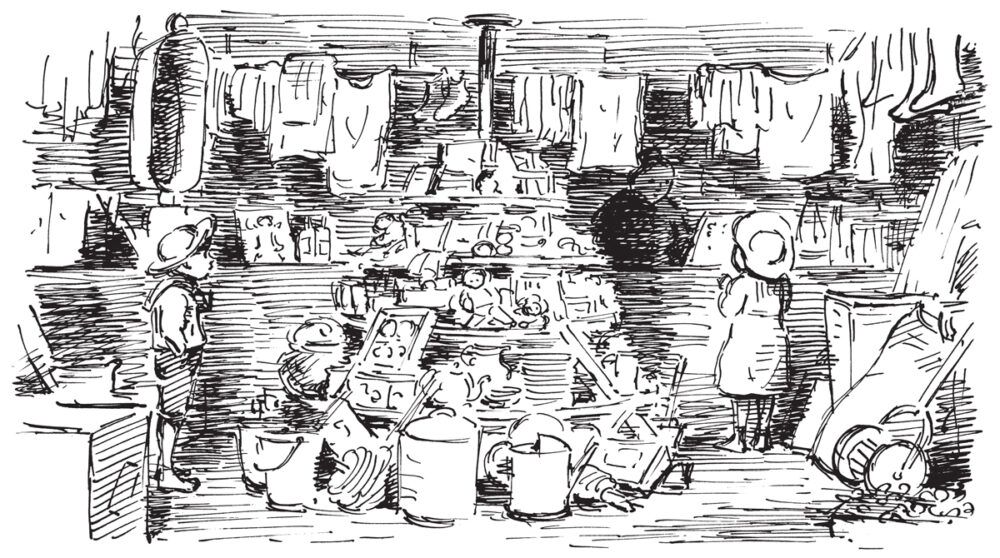Old memories are strange in the sense that one never can be sure how true they are. The most vivid of them are probably fairly accurate, even allowing for time and nostalgia to make the inevitable changes. Half and quarter memories are a different matter. What truth is there in them? Some may be quite fictitious but believed in just the same.
Often I would prefer to use, instead of ‘I remember’, the phrase ‘I think of so and so as’, or of ‘such and such as’. For instance, my most vivid memories of those early days in East Bergholt are of the shop, and I can truthfully say that I remember it. On the other hand, of Mrs Tweed who owned the shop I would rather say I think of her as a middle-aged plump partridge of a woman, a dark brown shadow in the shadows behind the counter at the back of the shop. But I would not swear to this in a court of law.
I think of Mr Tweed as a tall thin man, with a very pale face and very black hair and a very sweet, gentle manner, but again I could not swear to this. Yet I can swear to the fact that he produced the most delightful decorated hens’ eggs for our first Easter in the village; I remember them well. They were beautifully coloured and delicately patterned by scraping the shell with a knife. Poor Mr Tweed. We learnt later that he suffered from a mental sickness and from time to time would have to spend a period in the local mental hospital.
I remember this shop so well because my mother had rented rooms beside and behind it and, in a sense, the shop was almost part of our home.
As you went into the shop from the street entrance, to the left, right and facing you, making a smaller square in the larger square of the room, were rods attached by brackets to the ceiling. From these rods hung a strange assortment of goods: clothes of every kind, trousers, shirts, sunbonnets and pinafores. Then lengths of cloth, nests of galvanized buckets, a tin bath or two – in fact anything that could be conveniently hung up. These cast dark shadows on the three facing walls and the counters which lined two of them.
In the centre was an enormous pyramid of assorted merchandise. At the base were buckets, scrubbing brushes, garden shears, flowerpots and hanks of bass. Above that pots and pans and various articles of kitchen hardware. Above that again, cotton reels, collar studs, glass balls which, when you shook them, produced an internal snow-storm, glass paperweights, now so valuable, coloured wools, dolls, notepaper, cheap toys and so on, almost to the ceiling.
On the shelves behind the two counters were ranged many of the old proprietary medicines: Dr Collis Browne’s Chlorodyne, Scott’s Emulsion, syrup of figs, Mother Siegal’s Syrup, Gregory Powder, liquorice powder, cold drawn castor-oil, Beecham’s Pills, iodine and many powerful laxatives. Some of these we knew to our cost, liquorice powder being for me the most hated.
Also on these shelves were various groceries and sweets arranged in no very precise order. You might easily find the aniseed balls next to the chlorodyne or bags of sherbet shoulder to shoulder with the Gregory Powder.
Many of the groceries were sold loose, rice, sugar and beans being shovelled out of drawers with a scoop. If your mother asked you to buy an ounce of pepper it was weighed on a scale and handed to you in a twist of paper.
Sweets, of course, were our usual purchase and aniseed balls the favourite. They were round and smooth and immensely hard so they took a long time to dissolve in the mouth. They were so hard that chewing was impossible. They cost a farthing an ounce. For a farthing too one could buy a bag of sherbet with a hollow stick of liquorice to suck it up. Both these were in our price range, our weekly pocket money being but a penny.
The wall without a counter was lined with sacks of seed potatoes, fertilizers, drums of oil and heavy garden implements, all in the most delicious confusion.
For three small children of five, four and two respectively and new to England from distant China, this shop was something of a paradise.
Extract from Chapter 2: East Bergholt
Plain Foxed Edition: Edward Ardizzone, The Young Ardizzone © Edward Ardizzone 1970





